-
 Bitcoin
Bitcoin $81,840.6210
6.04% -
 Ethereum
Ethereum $1,597.9638
8.58% -
 Tether USDt
Tether USDt $0.9994
-0.03% -
 XRP
XRP $2.0026
9.84% -
 BNB
BNB $577.3606
3.57% -
 USDC
USDC $0.9999
-0.02% -
 Solana
Solana $114.7371
7.77% -
 Dogecoin
Dogecoin $0.1562
6.85% -
 TRON
TRON $0.2403
4.67% -
 Cardano
Cardano $0.6240
9.32% -
 UNUS SED LEO
UNUS SED LEO $9.3881
2.70% -
 Chainlink
Chainlink $12.3852
9.23% -
 Avalanche
Avalanche $18.0989
9.18% -
 Toncoin
Toncoin $2.9979
-1.98% -
 Stellar
Stellar $0.2349
5.96% -
 Hedera
Hedera $0.1711
12.93% -
 Shiba Inu
Shiba Inu $0.0...01206
10.22% -
 Sui
Sui $2.1408
8.96% -
 MANTRA
MANTRA $6.7043
7.73% -
 Bitcoin Cash
Bitcoin Cash $297.9565
9.10% -
 Litecoin
Litecoin $74.3475
4.91% -
 Polkadot
Polkadot $3.5400
2.22% -
 Dai
Dai $1.0000
0.00% -
 Bitget Token
Bitget Token $4.2732
4.64% -
 Ethena USDe
Ethena USDe $0.9989
0.02% -
 Hyperliquid
Hyperliquid $13.9883
12.96% -
 Pi
Pi $0.5955
5.14% -
 Monero
Monero $204.2372
4.47% -
 Uniswap
Uniswap $5.1811
7.08% -
 OKB
OKB $53.3943
3.95%
Which is riskier, leveraged trading or contract trading?
Leveraged trading amplifies gains and losses using borrowed funds, while contract trading involves futures and options with expiration risks. Both require careful risk management.
Apr 03, 2025 at 04:56 pm
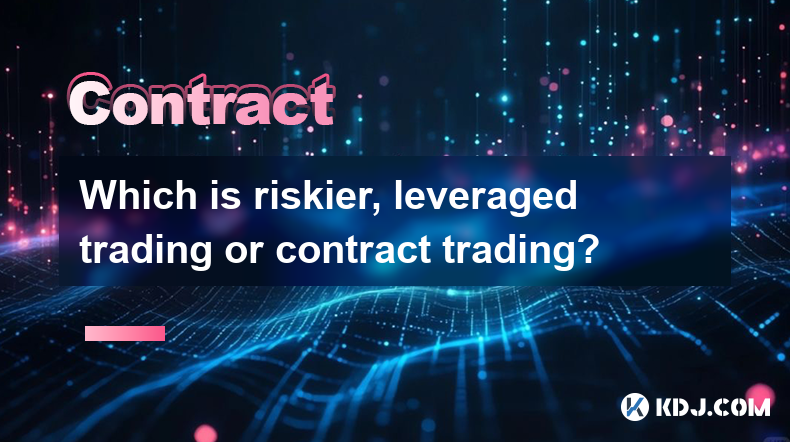
In the world of cryptocurrency, both leveraged trading and contract trading are popular methods for traders looking to amplify their potential returns. However, these methods also come with significant risks. Understanding the nuances of each can help traders make informed decisions about which method suits their risk tolerance and trading strategy.
What is Leveraged Trading?
Leveraged trading involves borrowing funds to increase the size of a trade. This can magnify both gains and losses. In the cryptocurrency market, leverage is often provided by exchanges or brokers, allowing traders to take larger positions than their actual capital would permit. For example, with 10x leverage, a trader can control a position worth ten times their initial investment.
Leveraged trading is appealing because it can lead to substantial profits if the market moves in the trader's favor. However, the flip side is equally potent; a small adverse movement in the market can result in significant losses, potentially exceeding the initial investment. This risk is heightened in the volatile cryptocurrency market, where prices can swing dramatically in a short period.
What is Contract Trading?
Contract trading, often referred to as futures trading in the cryptocurrency space, involves trading contracts that derive their value from an underlying asset, such as Bitcoin or Ethereum. These contracts have an expiration date and a predetermined price at which the asset can be bought or sold. There are two main types of contract trading: futures and options.
Futures contracts obligate the trader to buy or sell the underlying asset at a specified price on a specific date. Options contracts, on the other hand, give the trader the right, but not the obligation, to buy or sell the asset at the specified price before the expiration date. Contract trading allows traders to speculate on the future price of cryptocurrencies without owning the actual asset.
Risks Associated with Leveraged Trading
Leveraged trading carries several inherent risks that traders must be aware of. The most significant risk is the potential for liquidation. If the market moves against a leveraged position, the trader may be forced to close the position at a loss to cover the borrowed funds. This can happen quickly in the highly volatile crypto market, leading to substantial financial losses.
Another risk is margin calls. When the value of the collateral falls below a certain level, the broker may issue a margin call, requiring the trader to deposit additional funds to maintain the position. Failure to meet a margin call can result in the forced liquidation of the position.
Additionally, leveraged trading can lead to overtrading, where traders take on too many positions or use too much leverage, increasing their exposure to market volatility. This can result in significant losses if the market moves unfavorably.
Risks Associated with Contract Trading
Contract trading also comes with its own set of risks. One major risk is market volatility. Since contract prices are derived from the underlying asset, any sudden price movements can lead to significant losses, especially if the trader is on the wrong side of the trade.
Expiration risk is another concern in contract trading. As contracts approach their expiration date, their value can fluctuate dramatically, particularly if the market price of the underlying asset is close to the contract's strike price. This can result in losses if the trader does not manage the position effectively.
Counterparty risk is also a factor in contract trading. If the other party in the contract fails to fulfill their obligations, the trader may face losses. This risk is mitigated on centralized exchanges that act as the counterparty, but it remains a concern in decentralized platforms.
Comparing the Risks: Leveraged Trading vs. Contract Trading
When comparing the risks of leveraged trading and contract trading, several key differences emerge. Leveraged trading is generally considered riskier due to the potential for rapid and significant losses through liquidation and margin calls. The use of borrowed funds amplifies both gains and losses, making it a high-stakes endeavor.
Contract trading, while still risky, offers more flexibility and potentially less immediate risk. Options contracts, for instance, allow traders to limit their downside risk since they are not obligated to execute the contract if it moves against them. Futures contracts, on the other hand, carry the same risk of liquidation as leveraged trading if the market moves unfavorably.
However, contract trading introduces additional complexities such as expiration risk and counterparty risk, which may not be present in leveraged trading. Traders must carefully manage these risks to avoid significant losses.
Strategies to Mitigate Risks in Leveraged Trading
To mitigate the risks associated with leveraged trading, traders can employ several strategies:
Use lower leverage: Instead of using the maximum leverage available, traders can opt for lower leverage to reduce the potential for rapid losses. For example, using 2x or 3x leverage instead of 10x can help manage risk.
Set stop-loss orders: Implementing stop-loss orders can help limit losses by automatically closing a position if the market moves against it. This can prevent a small loss from turning into a catastrophic one.
Diversify positions: Spreading investments across different assets can reduce the impact of a loss on any single position. Diversification can help manage the overall risk in a leveraged trading portfolio.
Monitor positions closely: Given the high volatility of the cryptocurrency market, it's crucial to monitor leveraged positions closely. Regularly reviewing and adjusting positions can help manage risk effectively.
Strategies to Mitigate Risks in Contract Trading
Similarly, traders can use several strategies to mitigate the risks associated with contract trading:
Understand contract specifics: Before entering into a contract, traders should thoroughly understand the terms, including the expiration date, strike price, and any potential fees. This knowledge can help in making informed trading decisions.
Use options for risk management: Options contracts can be used to hedge against potential losses in other positions. For example, buying a put option can protect against a decline in the price of the underlying asset.
Manage expiration risk: As contracts approach their expiration date, traders should closely monitor their positions and be prepared to roll over or close out contracts to avoid unfavorable outcomes.
Choose reputable platforms: To mitigate counterparty risk, traders should use well-established and reputable exchanges or platforms for contract trading. This can help ensure that the other party in the contract will fulfill their obligations.
Real-World Examples of Risks in Leveraged and Contract Trading
To illustrate the risks associated with leveraged and contract trading, consider the following real-world examples:
Leveraged Trading Example: In May 2021, the cryptocurrency market experienced a significant downturn, with Bitcoin dropping from around $58,000 to below $30,000 in a matter of days. Many traders who had used high leverage to bet on continued upward momentum were liquidated, resulting in substantial losses. This event highlighted the dangers of using high leverage in a volatile market.
Contract Trading Example: In December 2017, the price of Bitcoin reached nearly $20,000, leading many traders to enter into futures contracts betting on further increases. However, the price soon plummeted, and those who had not hedged their positions or managed their contracts effectively faced significant losses. This example underscores the importance of understanding and managing the risks associated with contract trading.
Conclusion
Both leveraged trading and contract trading offer opportunities for significant profits in the cryptocurrency market, but they also come with substantial risks. Leveraged trading is generally considered riskier due to the potential for rapid and significant losses through liquidation and margin calls. Contract trading, while still risky, offers more flexibility and potentially less immediate risk, but introduces additional complexities such as expiration risk and counterparty risk.
Traders must carefully assess their risk tolerance and employ appropriate strategies to manage these risks effectively. Whether using lower leverage, setting stop-loss orders, diversifying positions, or understanding contract specifics, the key to successful trading lies in informed decision-making and diligent risk management.
Common Questions Related to Leveraged Trading and Contract Trading
Q: What is the main difference between leveraged trading and contract trading?
A: The main difference lies in the nature of the trade. Leveraged trading involves borrowing funds to increase the size of a trade, amplifying both potential gains and losses. Contract trading, on the other hand, involves trading contracts that derive their value from an underlying asset, with specific terms like expiration dates and strike prices.
Q: Which type of trading is more suitable for beginners?
A: Contract trading, particularly options trading, may be more suitable for beginners due to its flexibility and the ability to limit downside risk. Leveraged trading requires a higher level of understanding and risk management, making it more suitable for experienced traders.
Q: Can you lose more than your initial investment in leveraged trading?
A: Yes, in leveraged trading, it is possible to lose more than your initial investment. If the market moves against your position, you may be required to cover the losses with additional funds, potentially exceeding your initial investment.
Q: How can I manage the risks associated with contract trading?
A: To manage risks in contract trading, you can understand the specifics of the contracts, use options for risk management, manage expiration risk, and choose reputable platforms to mitigate counterparty risk.
Q: What are some common mistakes traders make in leveraged and contract trading?
A: Common mistakes include using too much leverage, not setting stop-loss orders, overtrading, not understanding contract specifics, and failing to manage expiration risk. These mistakes can lead to significant losses and should be avoided through careful planning and risk management.
Disclaimer:info@kdj.com
The information provided is not trading advice. kdj.com does not assume any responsibility for any investments made based on the information provided in this article. Cryptocurrencies are highly volatile and it is highly recommended that you invest with caution after thorough research!
If you believe that the content used on this website infringes your copyright, please contact us immediately (info@kdj.com) and we will delete it promptly.
- IRS Targets DeFi Platforms with New Reporting Rules
- 2025-04-10 17:35:13
- Byte Federal Suffers a Major Data Breach Exposing Data of Up to 58,000 Customers
- 2025-04-10 17:35:13
- EV3 Invests in Dtravel to Expand the DePIN Ecosystem
- 2025-04-10 17:30:13
- Bitcoin (BTC) Market Shows Mild Rebound, BTC Price Fluctuating in a Narrow Range
- 2025-04-10 17:30:13
- Bitcoin (BTC) and Ether (ETH) Exchange-Traded Funds (ETFs) Saw Outflows Wednesday Despite Cryptocurrencies' Price Surges
- 2025-04-10 17:25:13
- Standard Chartered Makes an Epic XRP Price Prediction
- 2025-04-10 17:25:13
Related knowledge

Why does a perpetual contract have no expiration date?
Apr 09,2025 at 08:43pm
Perpetual contracts, also known as perpetual futures or perpetual swaps, are a type of derivative product that has gained significant popularity in the cryptocurrency market. Unlike traditional futures contracts, which have a fixed expiration date, perpetual contracts do not expire. This unique feature raises the question: why does a perpetual contract ...
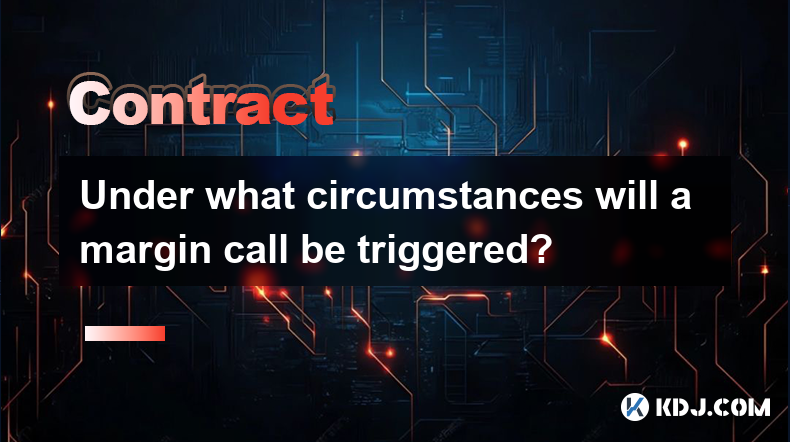
Under what circumstances will a margin call be triggered?
Apr 08,2025 at 02:43pm
Margin trading in the cryptocurrency market allows traders to borrow funds to increase their trading position, potentially amplifying both gains and losses. A critical aspect of margin trading is understanding when a margin call might be triggered, as it can significantly impact your trading strategy and financial health. In this article, we will explor...
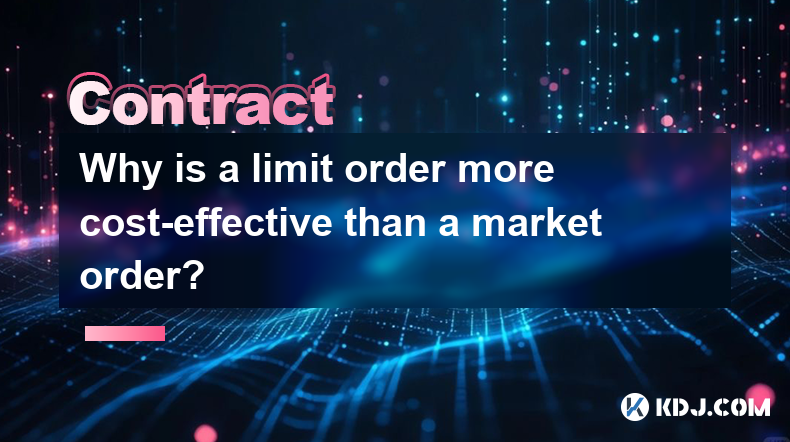
Why is a limit order more cost-effective than a market order?
Apr 10,2025 at 01:35pm
Why is a limit order more cost-effective than a market order? When trading cryptocurrencies, choosing the right type of order can significantly impact the cost-effectiveness of your transactions. Two common types of orders are limit orders and market orders. Understanding the differences between them can help you make more informed decisions and potenti...
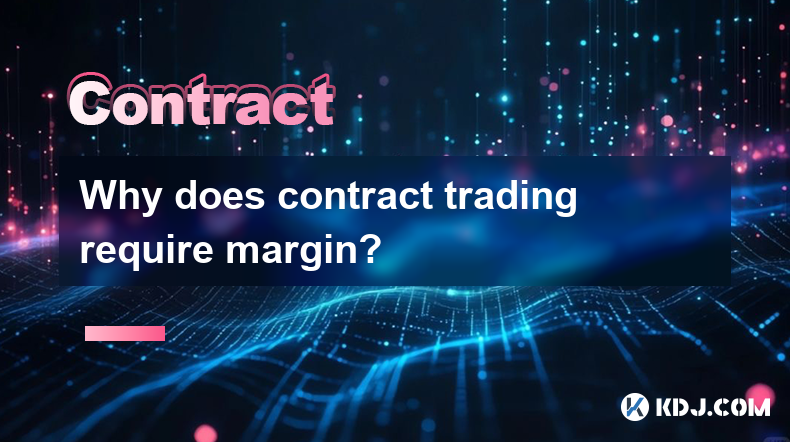
Why does contract trading require margin?
Apr 08,2025 at 02:07pm
Introduction to Contract TradingContract trading in the cryptocurrency market refers to the practice of trading futures or options contracts. These contracts allow traders to speculate on the future price of a cryptocurrency without actually owning the underlying asset. One of the key components of contract trading is the use of margin. Margin is essent...
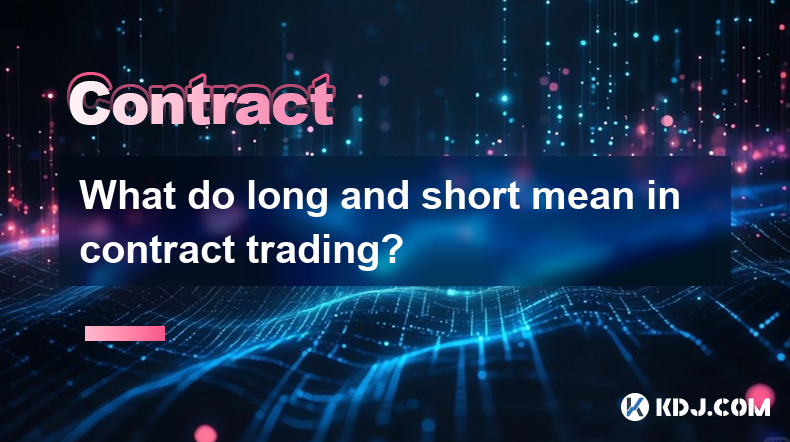
What do long and short mean in contract trading?
Apr 10,2025 at 06:42am
In the world of contract trading within the cryptocurrency circle, the terms 'long' and 'short' are fundamental concepts that every trader needs to understand. Long and short positions refer to the strategies traders use to bet on the future price movements of cryptocurrencies. When you take a long position, you are essentially betting that the price of...
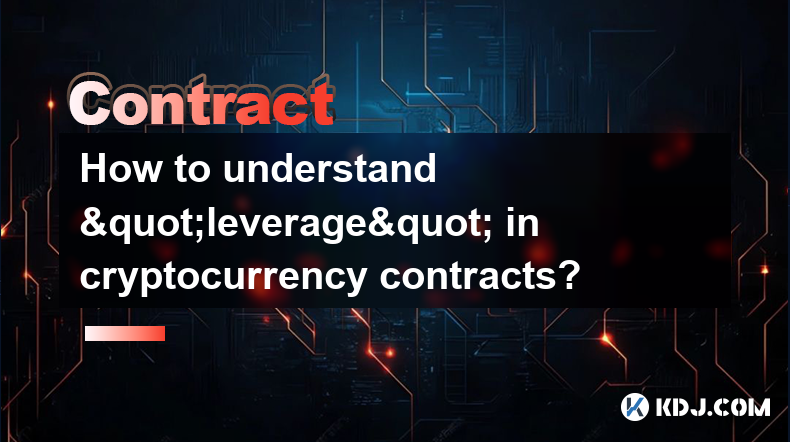
How to understand "leverage" in cryptocurrency contracts?
Apr 09,2025 at 10:36pm
Understanding 'leverage' in cryptocurrency contracts is crucial for anyone looking to engage in trading within the crypto market. Leverage allows traders to control a larger position in the market with a relatively small amount of capital. This concept can significantly amplify both potential profits and potential losses, making it a double-edged sword ...

Why does a perpetual contract have no expiration date?
Apr 09,2025 at 08:43pm
Perpetual contracts, also known as perpetual futures or perpetual swaps, are a type of derivative product that has gained significant popularity in the cryptocurrency market. Unlike traditional futures contracts, which have a fixed expiration date, perpetual contracts do not expire. This unique feature raises the question: why does a perpetual contract ...

Under what circumstances will a margin call be triggered?
Apr 08,2025 at 02:43pm
Margin trading in the cryptocurrency market allows traders to borrow funds to increase their trading position, potentially amplifying both gains and losses. A critical aspect of margin trading is understanding when a margin call might be triggered, as it can significantly impact your trading strategy and financial health. In this article, we will explor...

Why is a limit order more cost-effective than a market order?
Apr 10,2025 at 01:35pm
Why is a limit order more cost-effective than a market order? When trading cryptocurrencies, choosing the right type of order can significantly impact the cost-effectiveness of your transactions. Two common types of orders are limit orders and market orders. Understanding the differences between them can help you make more informed decisions and potenti...

Why does contract trading require margin?
Apr 08,2025 at 02:07pm
Introduction to Contract TradingContract trading in the cryptocurrency market refers to the practice of trading futures or options contracts. These contracts allow traders to speculate on the future price of a cryptocurrency without actually owning the underlying asset. One of the key components of contract trading is the use of margin. Margin is essent...

What do long and short mean in contract trading?
Apr 10,2025 at 06:42am
In the world of contract trading within the cryptocurrency circle, the terms 'long' and 'short' are fundamental concepts that every trader needs to understand. Long and short positions refer to the strategies traders use to bet on the future price movements of cryptocurrencies. When you take a long position, you are essentially betting that the price of...

How to understand "leverage" in cryptocurrency contracts?
Apr 09,2025 at 10:36pm
Understanding 'leverage' in cryptocurrency contracts is crucial for anyone looking to engage in trading within the crypto market. Leverage allows traders to control a larger position in the market with a relatively small amount of capital. This concept can significantly amplify both potential profits and potential losses, making it a double-edged sword ...
See all articles





















































































